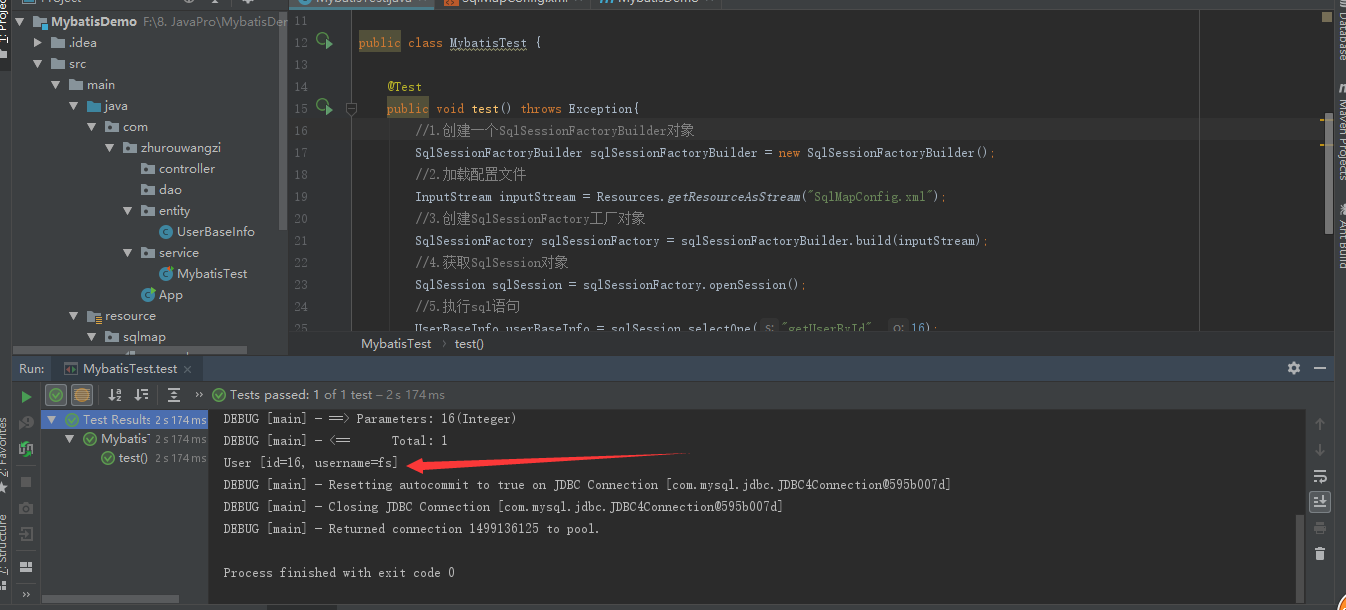1, Create a project (this article takes the project that Idea builds based on Maven as an example)
- New->Project
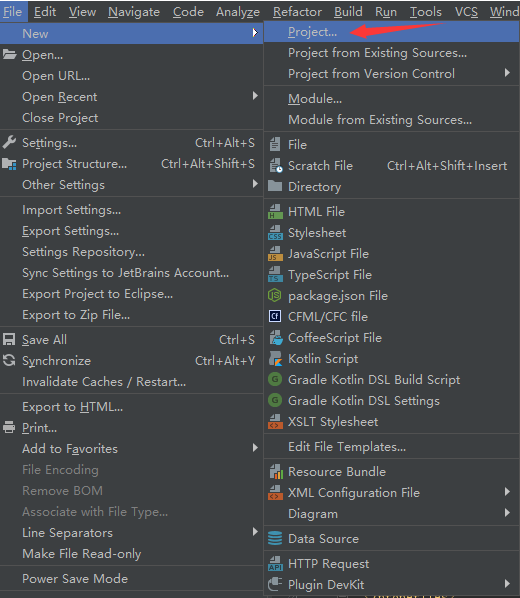
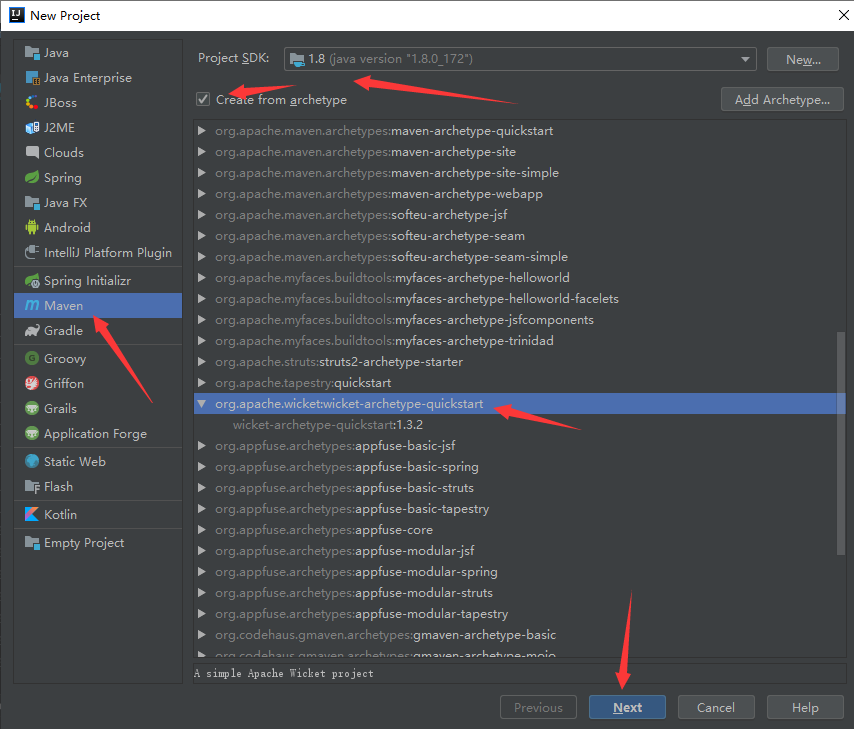
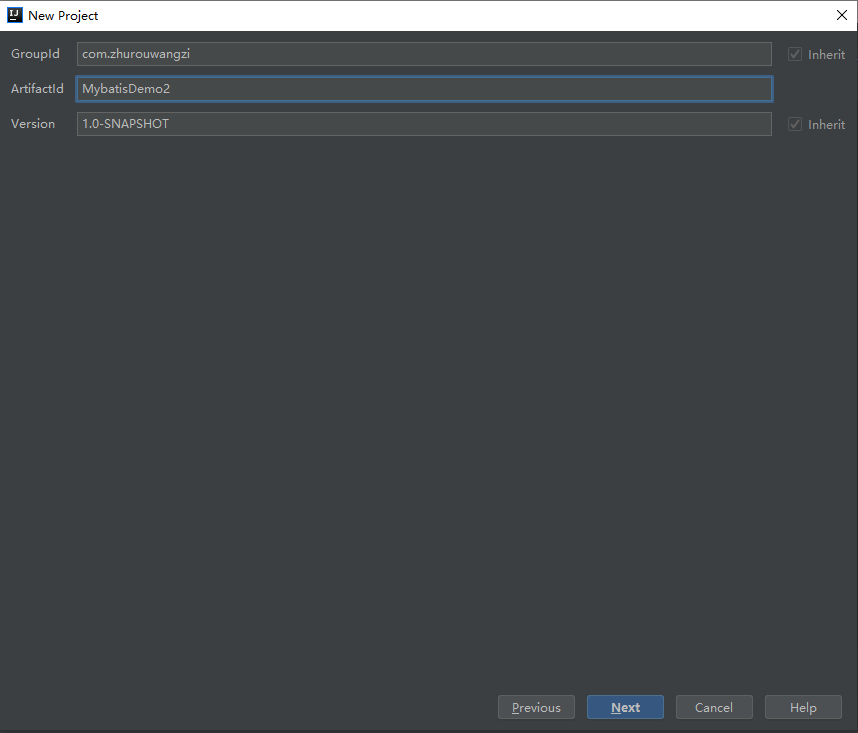
- I choose my local Maven and configuration here
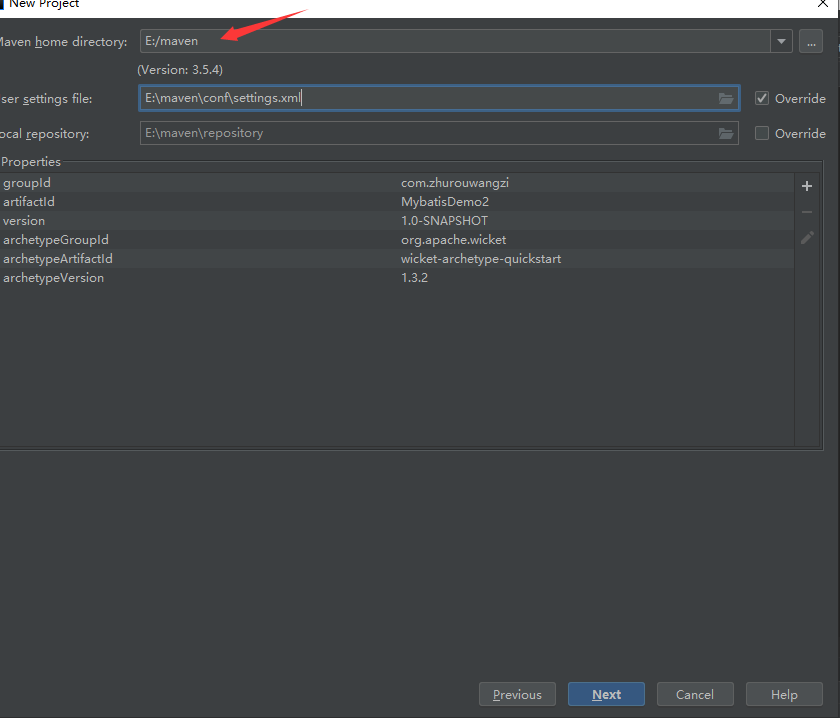
- Finally, click Finish
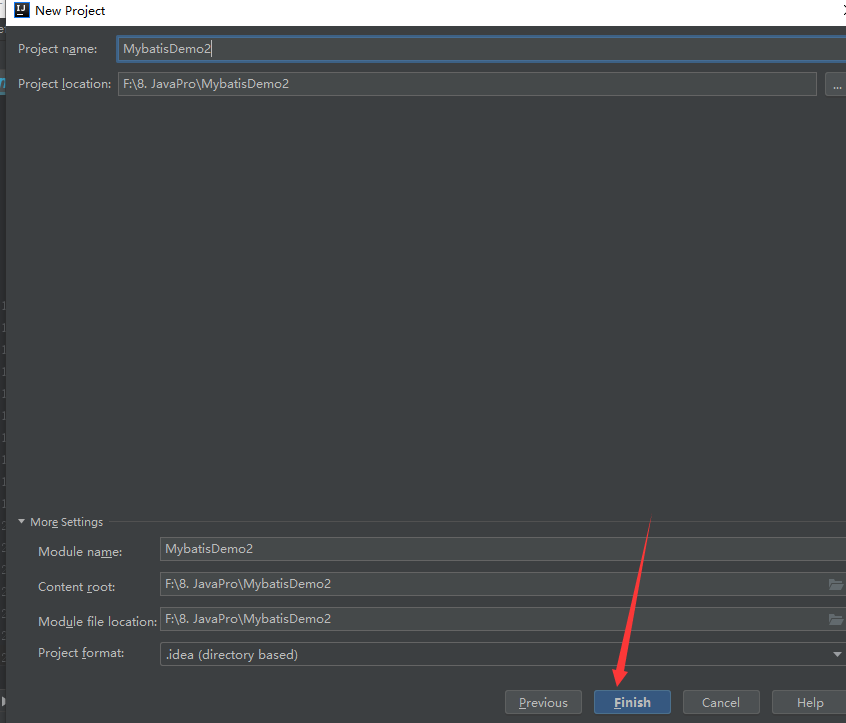
2, Add dependency package in configuration file
- Add package dependency of Mybatis, JDBC driver and log4j log management in pom.xml configuration file
- The complete code is as follows:
<?xml version="1.0" encoding="UTF-8"?> <project xmlns="http://maven.apache.org/POM/4.0.0" xmlns:xsi="http://www.w3.org/2001/XMLSchema-instance" xsi:schemaLocation="http://maven.apache.org/POM/4.0.0 http://maven.apache.org/xsd/maven-4.0.0.xsd"> <modelVersion>4.0.0</modelVersion> <groupId>com.zhurouwangzi</groupId> <artifactId>MybatisDemo</artifactId> <version>1.0-SNAPSHOT</version> <name>MybatisDemo</name> <!-- FIXME change it to the project's website --> <url>http://www.example.com</url> <properties> <project.build.sourceEncoding>UTF-8</project.build.sourceEncoding> <maven.compiler.source>1.7</maven.compiler.source> <maven.compiler.target>1.7</maven.compiler.target> <!--mybatis Edition--> <mybatis.version>3.2.7</mybatis.version> <!--log4j Edition--> <slf4j.version>1.6.6</slf4j.version> <log4j.version>1.2.12</log4j.version> </properties> <dependencies> <dependency> <groupId>junit</groupId> <artifactId>junit</artifactId> <version>4.11</version> <scope>test</scope> </dependency> <!-- mybatis Core package --> <dependency> <groupId>org.mybatis</groupId> <artifactId>mybatis</artifactId> <version>${mybatis.version}</version> </dependency> <!-- mysql Driving package --> <dependency> <groupId>mysql</groupId> <artifactId>mysql-connector-java</artifactId> <version>5.1.29</version> </dependency> <!-- Log file management package --> <!-- log start --> <dependency> <groupId>log4j</groupId> <artifactId>log4j</artifactId> <version>${log4j.version}</version> </dependency> <dependency> <groupId>org.slf4j</groupId> <artifactId>slf4j-api</artifactId> <version>${slf4j.version}</version> </dependency> <dependency> <groupId>org.slf4j</groupId> <artifactId>slf4j-log4j12</artifactId> <version>${slf4j.version}</version> </dependency> <dependency> <groupId>org.junit.jupiter</groupId> <artifactId>junit-jupiter-api</artifactId> <version>RELEASE</version> <scope>compile</scope> </dependency> </dependencies> <build> <pluginManagement><!-- lock down plugins versions to avoid using Maven defaults (may be moved to parent pom) --> <plugins> <!-- clean lifecycle, see https://maven.apache.org/ref/current/maven-core/lifecycles.html#clean_Lifecycle --> <plugin> <artifactId>maven-clean-plugin</artifactId> <version>3.1.0</version> </plugin> <!-- default lifecycle, jar packaging: see https://maven.apache.org/ref/current/maven-core/default-bindings.html#Plugin_bindings_for_jar_packaging --> <plugin> <artifactId>maven-resources-plugin</artifactId> <version>3.0.2</version> </plugin> <plugin> <artifactId>maven-compiler-plugin</artifactId> <version>3.8.0</version> </plugin> <plugin> <artifactId>maven-surefire-plugin</artifactId> <version>2.22.1</version> </plugin> <plugin> <artifactId>maven-jar-plugin</artifactId> <version>3.0.2</version> </plugin> <plugin> <artifactId>maven-install-plugin</artifactId> <version>2.5.2</version> </plugin> <plugin> <artifactId>maven-deploy-plugin</artifactId> <version>2.8.2</version> </plugin> <!-- site lifecycle, see https://maven.apache.org/ref/current/maven-core/lifecycles.html#site_Lifecycle --> <plugin> <artifactId>maven-site-plugin</artifactId> <version>3.7.1</version> </plugin> <plugin> <artifactId>maven-project-info-reports-plugin</artifactId> <version>3.0.0</version> </plugin> </plugins> </pluginManagement> </build> </project>
- After downloading the dependency package, we can see:
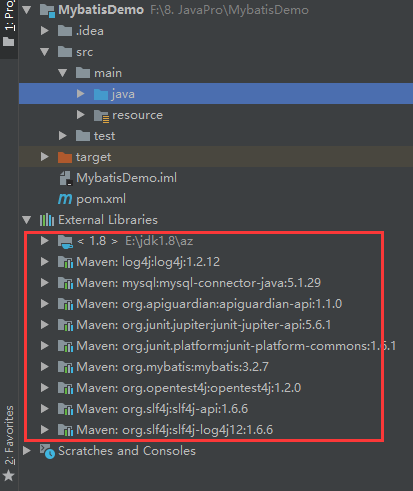
- Add a resource folder under src and right-click Mark Directory As Resources Root
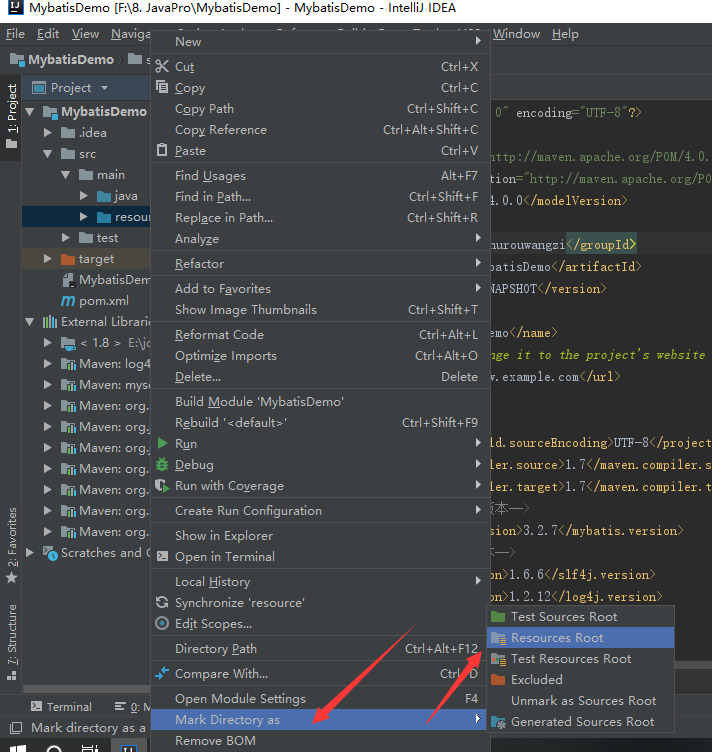
- Create SqlMapConfig.xml as the global configuration file of Mybatis in src/resource folder
- After src/resource, create a log4j.properties file to configure the log file
- Create another sqlmap folder in src/resource to store the mapping files of Mybatis
- The created project structure is as follows:
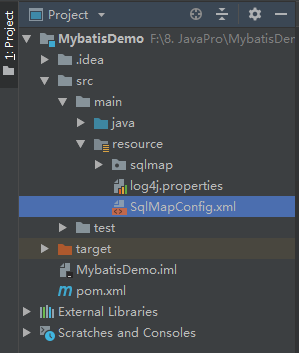
3, Set Mybatis related profile
- The contents of log4j.properties configuration file are as follows:
# Global logging configuration log4j.rootLogger=DEBUG, stdout # Console output... log4j.appender.stdout=org.apache.log4j.ConsoleAppender log4j.appender.stdout.layout=org.apache.log4j.PatternLayout log4j.appender.stdout.layout.ConversionPattern=%5p [%t] - %m%n
- The content of SqlMapConfig.xml configuration file is as follows:
<?xml version="1.0" encoding="UTF-8" ?> <!DOCTYPE configuration PUBLIC "-//mybatis.org//DTD Config 3.0//EN" "http://mybatis.org/dtd/mybatis-3-config.dtd"> <configuration> <!-- and spring After integration environments Configuration will be abolished--> <environments default="development"> <environment id="development"> <!-- Use jdbc transaction management--> <transactionManager type="JDBC" /> <!-- Database connection pool--> <dataSource type="POOLED"> <property name="driver" value="com.mysql.jdbc.Driver" /> <property name="url" value="jdbc:mysql://localhost:3306/web_test3?characterEncoding=utf-8" /> <property name="username" value="root" /> <property name="password" value="root" /> </dataSource> </environment> </environments> </configuration>
4, Create entity class
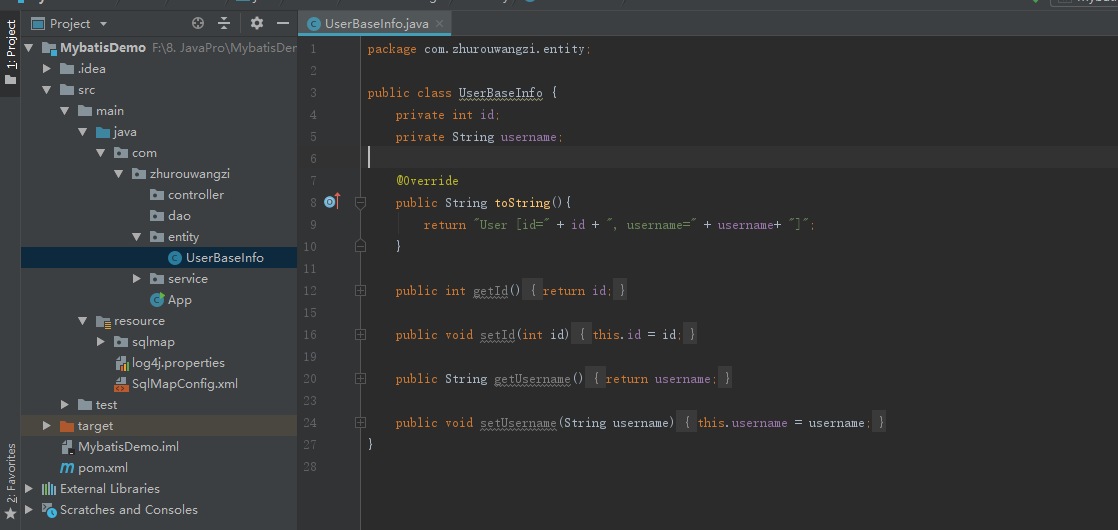
package com.zhurouwangzi.entity; public class UserBaseInfo { private int id; private String username; @Override public String toString(){ return "User [id=" + id + ", username=" + username+ "]"; } public int getId() { return id; } public void setId(int id) { this.id = id; } public String getUsername() { return username; } public void setUsername(String username) { this.username = username; } }
- Add user.xml as the mapping file of UserBaseInfo in src/resource/sqlmap folder
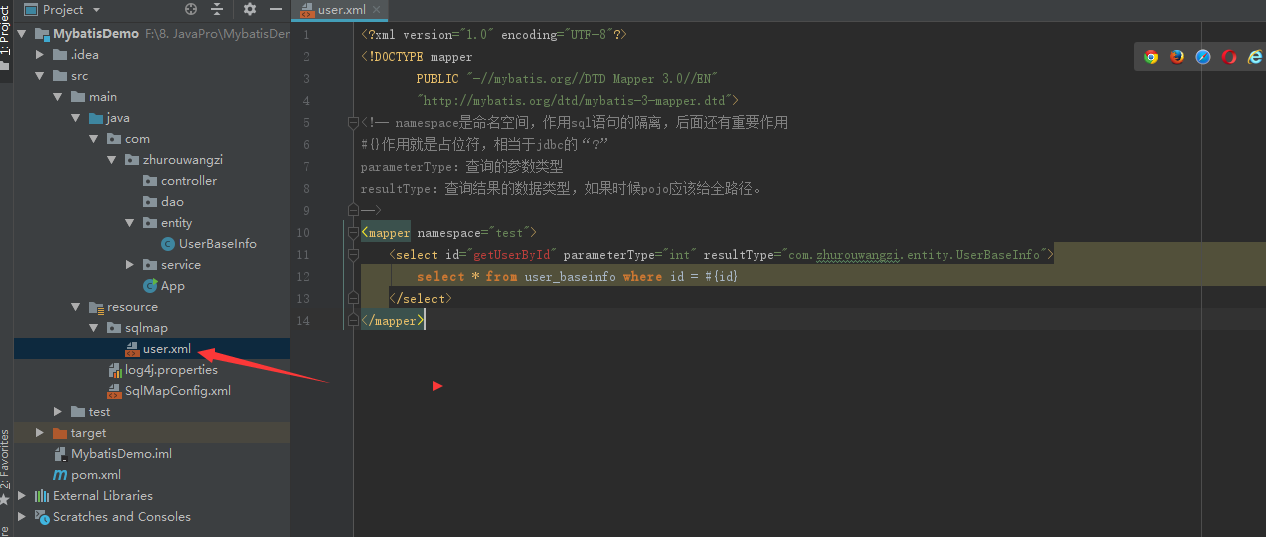
<?xml version="1.0" encoding="UTF-8"?> <!DOCTYPE mapper PUBLIC "-//mybatis.org//DTD Mapper 3.0//EN" "http://mybatis.org/dtd/mybatis-3-mapper.dtd"> <!-- namespace Is namespace, role sql The isolation of statements plays an important role later #{}The function is a placeholder, equivalent to jdbc "?" parameterType: Parameter type of query resultType: Data type of query result, if pojo Full path should be given. --> <mapper namespace="test"> <select id="getUserById" parameterType="int" resultType="com.zhurouwangzi.entity.UserBaseInfo"> select * from user_baseinfo where id = #{id} </select> </mapper>
- Add < mappers > configuration in SqlMapConfig.xml configuration file:
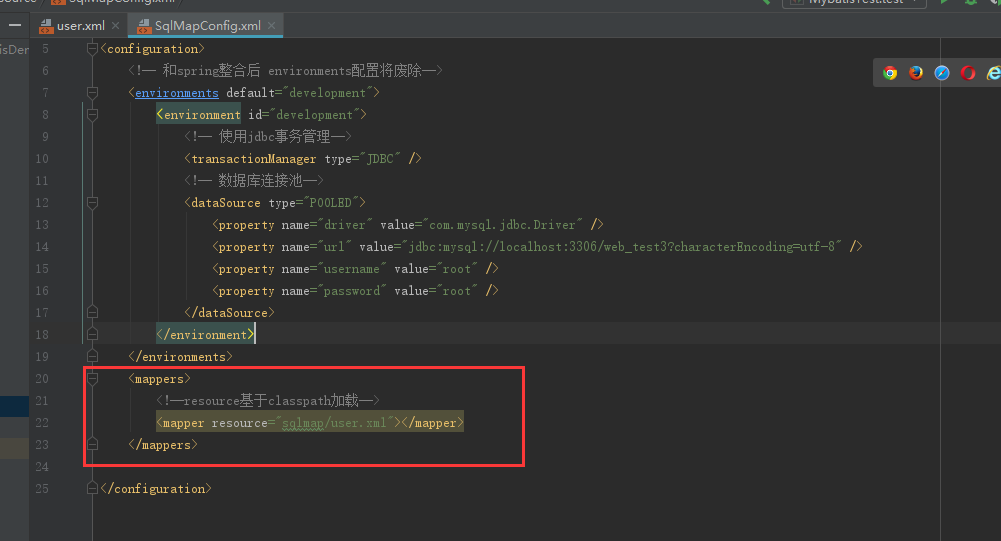
5, Test with test method area
- The code is as follows:
package com.zhurouwangzi.service; import com.zhurouwangzi.entity.UserBaseInfo; import org.apache.ibatis.io.Resources; import org.apache.ibatis.session.SqlSession; import org.apache.ibatis.session.SqlSessionFactory; import org.apache.ibatis.session.SqlSessionFactoryBuilder; import org.junit.jupiter.api.Test; import java.io.InputStream; public class MybatisTest { @Test public void test() throws Exception{ //1.Create a SqlSessionFactoryBuilder object SqlSessionFactoryBuilder sqlSessionFactoryBuilder = new SqlSessionFactoryBuilder(); //2.Load profile InputStream inputStream = Resources.getResourceAsStream("SqlMapConfig.xml"); //3.Establish SqlSessionFactory Factory object SqlSessionFactory sqlSessionFactory = sqlSessionFactoryBuilder.build(inputStream); //4.Obtain SqlSession object SqlSession sqlSession = sqlSessionFactory.openSession(); //5.implement sql Sentence UserBaseInfo userBaseInfo = sqlSession.selectOne("getUserById", 16); System.out.println(userBaseInfo); //close resource sqlSession.close(); } }
The operation results are as follows:
